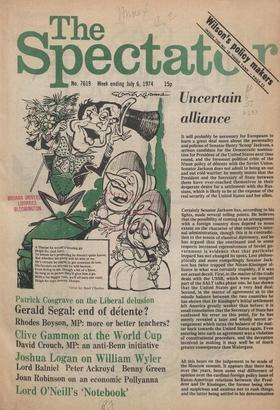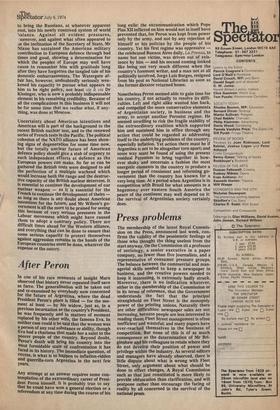Uncertain alliance
It will probably be necessary for Europeans to learn a great deal more about the personality and policies of Senator Henry 'Scoop' Jackson, a serious candidate for the Democratic nomination for President of the United States next time round, and the foremost political critic of the N;xon policy of detente with the Soviet Union. Senator Jackson does not admit to being an out and out cold warrior: he merely insists that the President and the Secretary of State between them have over-reached themselves in their desperate desire for a settlement with the Russians, which is likely to be at the expense of the real security of the United States and her allies.
Certainly Senator Jackson has, according to his lights, made several telling points. He believes that the possibility of coming to an arrangement with a foreign country does depend to some extent on the character of that country's internal administration, though this is in contradiction to the tenets of classical diplomacy, and he has argued that the continued and in some respects increased repressiveness of Soviet government is evidence that that particular leopard has not changed its spots. Less philosophically and more compellingly Senator Jackson has twice trapped the Nixon-Kissinger alliance in what was certainly stupidity, if it was not actual deceit. First, in the matter of the trade deals with the USSR, which were an integral part of the SALT talks phase one, he has shown that the United States got a very bad deal. Second, in the matter of agreement as to the missile balance between the two countries he has shown that Dr Kissinger's initial settlement left America greatly weaker than before: it is small consolation that the Secretary of State has confessed his error on this point, for he has merely revealed a later and wholly secret arrangement which turns the balance of the matter back towards the United States again. Even entering into such an agreement was a violation of constitutional procedure, and the deception involved in making it may well be of much greater consequence than Watergate.
All this bears on the judgement to be made of the Moscow summit. It appears that there has, over the years, been some real difference of opinion over the cardinal foreign policy issue of Russo-American relations between the President and Dr Kissinger, the former being slow and suspicious and anxious not to rush things, and the latter being settled in his determination to bring the Russians, at whatever apparent cost, into his newly contrived system of world 'lalance. Against all evident pressures, ioreover, and against what often appeared to Je the inclination of the Secretary of State, Mr Nixon has sustained the American military contribution to European defence through bad times and good, showing a determination for which the peoples of Europe may well have cause to remember him with gratitude long after they have forgotten the tangled tale of his domestic embarrassments. The Watergate affair has, however, undoubtedly seriously weakened his capacity to pursue what appears to him to be right policy, not least vis vis Dr Kissinger, who is now a probably indispensable element in his remaining credibility. Because of all the complications in this business it will not be for some time that we realise what, if anything, was done at Moscow.
Uncertainty about American intentions and American will is part of the background to the recent British nuclear test, and to the renewed series of French tests in the Pacific. The political cohesion of the NATO alliance has been showing signs of degeneration for some time now, but the totally unclear future of American defence policy should give a stab of urgency to such independent efforts at defence as the European powers can make. So far as can be gathered the British tests were designed to aid the perfection of a multiple warhead which would increase both the range and the destructive capacity of the British nuclear deterrent. It is essential to continue the development of our nuclear weapon — as it is essential for the French to continue the development of theirs — as long as there is any doubt about American intentions for the future, and Mr Wilson's government is all the more to be praised for seeing this because of very serious pressures in the Labour movement which might have caused them to adopt a contrary policy. There are difficult times ahead for the Western alliance, and everything that can be done to ensure that some serious capacity to protect themselves against aggression remains in the hands of the European countries must be done, whatever the expense or the outcry.



































